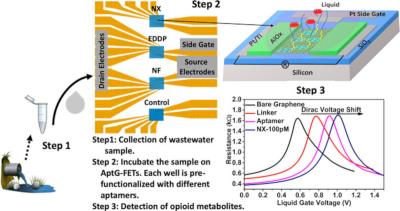
by MBF Admin | Feb 27, 2022 | 2D materials, Aerospace, AGM, Angstron Materials, Audio, Development, G-FET, Graphene applications, Graphene Sensors, Investment, Medicine, Products, Research, Technical / Research, Transistors
Researchers from Boston College, Boston University, and Giner Labs have designed a small graphene-based multiplexed bio-sensor that detects opioid byproducts in wastewater.The novel device uses graphene-based field effect transistors to detect four different synthetic...
by MBF Admin | Feb 22, 2022 | 2D materials, Aerospace, AGM, Angstron Materials, Audio, Cambridge University, Development, Graphene investing and financials, Investment, Lasers, Medicine, Products, Research
Cambridge Raman Imaging (CRI) has announced it was selected to coordinate a project that received a €3.3 million grant in the European Innovation Council’s (EIC) Transition call.The project, called CHARM, aims to develop a medical device based on high-speed, low-cost...
by MBF Admin | Feb 5, 2022 | 2D materials, Aerospace, AGM, Angstron Materials, Audio, Development, Graphene applications, Graphene Sensors, Investment, Medicine, Products, Research
A research group from Sweden’s Chalmers University of Technology and the Technical University of Denmark has shown that graphene can rapidly distinguish between types of bacteria. The team therefore set out to create extremely sensitive sensors, that can...
by MBF Admin | Jan 9, 2022 | 2D materials, Aerospace, AGM, Angstron Materials, Audio, Development, Graphene Flagship, Investment, Medicine, Products, Research
Grapheal has received an award for its graphene-enabled products at CES 2022.Graphene Flagship Associated Member Grapheal has won the “Best in Innovation” Award from the Consumer Electronics Show (CES), considered the world’s most influential technology event. “We’re...
by MBF Admin | Dec 26, 2021 | 2D materials, Aerospace, AGM, Angstron Materials, Audio, Development, Graphene applications, Graphene Flagship, Graphene Sensors, Investment, Medicine, Products, Research, Technical / Research, Transistors, University of Manchester
Researchers the UK and Spain have demonstrated that tiny graphene neural probes can be used safely to improve our understanding of the causes of epilepsy.The graphene depth neural probe (gDNP) consists of a millimeter-long linear array of micro-transistors imbedded in...
by MBF Admin | Dec 26, 2021 | 2D materials, Aerospace, AGM, Angstron Materials, Audio, Development, Graphene applications, Graphene Sensors, Investment, Medicine, Products, Research
Researchers at the University of Technology Sydney (UTS) have developed a novel graphene-based biosensor, set to drive new innovations in brain-controlled robotics.The biosensor adheres to the skin of the face and head in order to detect electrical signals being sent...


